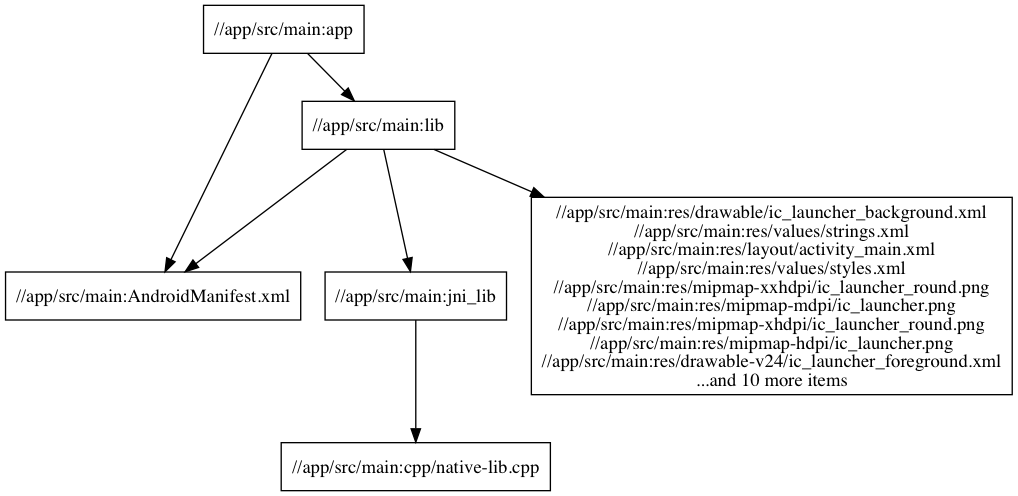如果您是 Bazel 新手,请先参阅使用 Bazel 构建 Android 教程。
概览
Bazel 可以在许多不同的 build 配置中运行,包括使用 Android 原生开发套件 (NDK) 工具链的几种配置。这意味着,正常的 cc_library 和 cc_binary 规则可以直接在 Bazel 中针对 Android 进行编译。Bazel 通过使用 android_ndk_repository 代码库规则来实现此目的。
前提条件
请确保您已安装 Android SDK 和 NDK。
如需设置 SDK 和 NDK,请将以下代码段添加到 WORKSPACE:
android_sdk_repository(
name = "androidsdk", # Required. Name *must* be "androidsdk".
path = "/path/to/sdk", # Optional. Can be omitted if `ANDROID_HOME` environment variable is set.
)
android_ndk_repository(
name = "androidndk", # Required. Name *must* be "androidndk".
path = "/path/to/ndk", # Optional. Can be omitted if `ANDROID_NDK_HOME` environment variable is set.
)
如需详细了解 android_ndk_repository 规则,请参阅构建百科全书条目。
如果您使用的是最新版 Android NDK(r22 及更高版本),请使用 android_ndk_repository 的 Starlark 实现。
按照其 README 中的说明操作。
快速入门
如需为 Android 构建 C++,只需将 cc_library 依赖项添加到 android_binary 或 android_library 规则中即可。
例如,假设某个 Android 应用的 BUILD 文件如下所示:
# In <project>/app/src/main/BUILD.bazel
cc_library(
name = "jni_lib",
srcs = ["cpp/native-lib.cpp"],
)
android_library(
name = "lib",
srcs = ["java/com/example/android/bazel/MainActivity.java"],
resource_files = glob(["res/**/*"]),
custom_package = "com.example.android.bazel",
manifest = "LibraryManifest.xml",
deps = [":jni_lib"],
)
android_binary(
name = "app",
deps = [":lib"],
manifest = "AndroidManifest.xml",
)
此 BUILD 文件会生成以下目标图:

图 1. 具有 cc_library 依赖项的 Android 项目的 build 图。
如需构建应用,只需运行以下命令:
bazel build //app/src/main:appbazel build 命令会编译 Java 文件、Android 资源文件和 cc_library 规则,并将所有内容打包到 APK 中:
$ zipinfo -1 bazel-bin/app/src/main/app.apk
nativedeps
lib/armeabi-v7a/libapp.so
classes.dex
AndroidManifest.xml
...
res/...
...
META-INF/CERT.SF
META-INF/CERT.RSA
META-INF/MANIFEST.MFBazel 会将所有 cc_library 编译成一个共享对象 (.so) 文件,默认情况下以 armeabi-v7a ABI 为目标平台。如需更改此设置或同时为多个 ABI 进行构建,请参阅有关配置目标 ABI 的部分。
示例设置
此示例可在 Bazel 示例代码库中找到。
在 BUILD.bazel 文件中,使用 android_binary、android_library 和 cc_library 规则定义了三个目标。
android_binary 顶级目标会构建 APK。
cc_library 目标包含一个具有 JNI 函数实现的 C++ 源文件:
#include <jni.h>
#include <string>
extern "C"
JNIEXPORT jstring
JNICALL
Java_com_example_android_bazel_MainActivity_stringFromJNI(
JNIEnv *env,
jobject /* this */) {
std::string hello = "Hello from C++";
return env->NewStringUTF(hello.c_str());
}
android_library 目标指定 Java 源代码、资源文件以及对 cc_library 目标的依赖关系。在此示例中,MainActivity.java 加载共享对象文件 libapp.so,并定义 JNI 函数的方法签名:
public class MainActivity extends AppCompatActivity {
static {
System.loadLibrary("app");
}
@Override
protected void onCreate(Bundle savedInstanceState) {
// ...
}
public native String stringFromJNI();
}
配置目标 ABI
如需配置目标 ABI,请使用 --android_platforms 标志,如下所示:
bazel build //:app --android_platforms=comma-separated list of platforms与 --platforms 标志一样,传递给 --android_platforms 的值是 platform 目标的标签,使用标准限制值来描述您的设备。
例如,对于搭载 64 位 ARM 处理器的 Android 设备,您可以按如下方式定义平台:
platform(
name = "android_arm64",
constraint_values = [
"@platforms//os:android",
"@platforms//cpu:arm64",
],
)
每个 Android platform 都应使用 @platforms//os:android OS 限制。如需迁移 CPU 限制,请查看此图表:
| CPU 值 | 平台 |
|---|---|
armeabi-v7a |
@platforms//cpu:armv7 |
arm64-v8a |
@platforms//cpu:arm64 |
x86 |
@platforms//cpu:x86_32 |
x86_64 |
@platforms//cpu:x86_64 |
当然,对于多架构 APK,您需要传递多个标签,例如:--android_platforms=//:arm64,//:x86_64(假设您已在顶级 BUILD.bazel 文件中定义了这些标签)。
Bazel 无法选择默认 Android 平台,因此必须使用 --android_platforms 定义并指定一个平台。
根据 NDK 修订版本和 Android API 级别,以下 ABI 可用:
| NDK 修订版本 | ABI |
|---|---|
| 16 及更低 | armeabi、armeabi-v7a、arm64-v8a、mips、mips64、x86、x86_64 |
| 17 及以上 | armeabi-v7a、arm64-v8a、x86、x86_64 |
如需详细了解这些 ABI,请参阅 NDK 文档。
不建议将多 ABI 胖 APK 用于发布 build,因为它们会增加 APK 的大小,但可用于开发和 QA build。
选择 C++ 标准
使用以下标志可根据 C++ 标准进行构建:
| C++ 标准 | 标志 |
|---|---|
| C++98 | 默认,无需标志 |
| C++11 | --cxxopt=-std=c++11 |
| C++14 | --cxxopt=-std=c++14 |
| C++17 | --cxxopt=-std=c++17 |
例如:
bazel build //:app --cxxopt=-std=c++11如需详细了解如何通过 --cxxopt、--copt 和 --linkopt 传递编译器和链接器标志,请参阅用户手册。
编译器和链接器标志也可以在 cc_library 中使用 copts 和 linkopts 指定为属性。例如:
cc_library(
name = "jni_lib",
srcs = ["cpp/native-lib.cpp"],
copts = ["-std=c++11"],
linkopts = ["-ldl"], # link against libdl
)
在不使用 android_binary 的情况下为 Android 构建 cc_library
如需在不使用 android_binary 的情况下为 Android 构建独立的 cc_binary 或 cc_library,请使用 --platforms 标志。
例如,假设您已在 my/platforms/BUILD 中定义了 Android 平台:
bazel build //my/cc/jni:target \
--platforms=//my/platforms:x86_64采用此方法后,整个 build 树都会受到影响。
这些标志可以放入 project/.bazelrc 中的 bazelrc 配置(每个 ABI 一个):
common:android_x86 --platforms=//my/platforms:x86
common:android_armeabi-v7a --platforms=//my/platforms:armeabi-v7a
# In general
common:android_<abi> --platforms=//my/platforms:<abi>
然后,如需为 x86 构建 cc_library,请运行:
bazel build //my/cc/jni:target --config=android_x86一般来说,对于低级目标(如 cc_library),或者当您确切知道自己要构建什么时,请使用此方法;对于高级目标,如果您希望构建许多不受您控制的目标,请依赖 android_binary 的自动配置转换。

